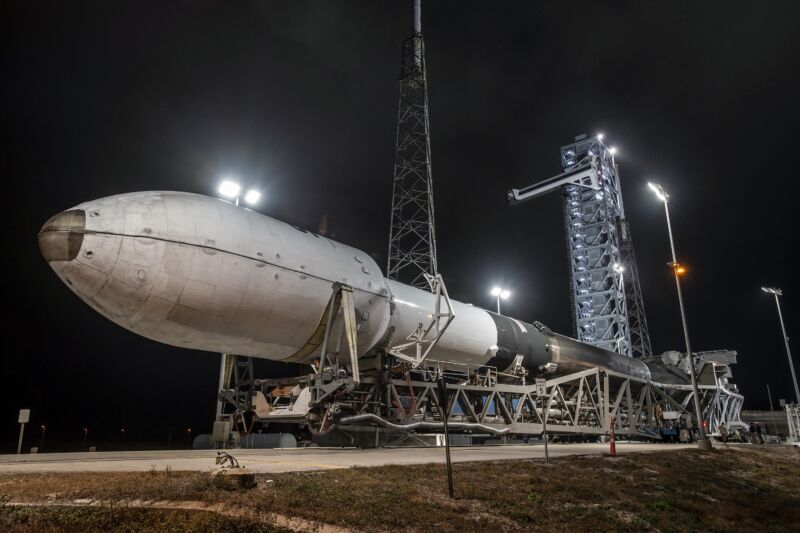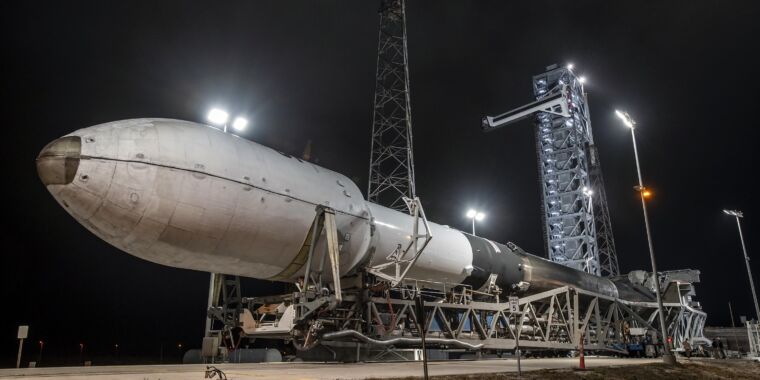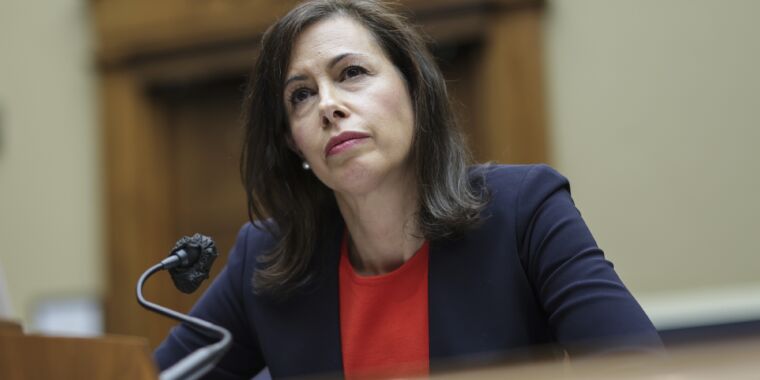
Amazon announced Friday that it has purchased three Falcon 9 rocket launches from SpaceX beginning in mid-2025 to help deploy the retail giant’s network of Kuiper Internet satellites.
In a statement, Amazon said the SpaceX launches will provide “additional capacity” to “supplement existing launch contracts to support Project Kuiper’s satellite deployment schedule.” SpaceX has its own broadband satellite fleet, with more than 5,100 Starlink spacecraft currently in orbit, making it a competitor with Amazon.
Last year, Amazon bought up most of the Western world’s excess launch capacity from everyone but SpaceX, securing 68 rocket flights from United Launch Alliance, Arianespace, and Blue Origin to deploy thousands of satellites for the Kuiper broadband network. Amazon previously contracted with ULA for nine Atlas V launches to support the initial series of Kuiper launches, the first of which lifted off in October with Amazon’s first two Kuiper prototype satellites. More Atlas Vs will start launching operational Kuiper satellites next year.
SpaceX’s Falcon 9 rocket, the world’s most reliable launch vehicle, was left out of Amazon’s multibillion-dollar rocket purchase. This led to a lawsuit filed in August by shareholders of a pension fund that includes Amazon stock. The suit claims Amazon, its founder Jeff Bezos, and its board of directors breached “their fiduciary duty” and failed to consider SpaceX during the launch service procurement.
Aside from the Atlas V, which Amazon will lean on to launch its first batches of satellites, none of the rockets needed to deploy the Kuiper network have flown. Production of Atlas V rockets is winding down, and there are no more of those for Amazon to buy.
The Falcon 9 rocket is the only rocket with any openings in its launch schedule that could make up a shortfall from delays caused by Amazon’s other launch providers. SpaceX has launched 88 Falcon 9 or Falcon Heavy rockets so far this year and aims to increase the launch cadence to one flight every 2.5 days in 2024. Most of these launches are for SpaceX’s own Starlink Internet network.
But the plaintiffs in the lawsuit allege that Amazon didn’t consider the Falcon 9 rocket last year due to an intense and personal rivalry between Elon Musk, SpaceX’s founder, and Bezos. That rivalry, it appears, has been eclipsed by the cold reality that Amazon needs some help from SpaceX.
“The only other Western company with a heritage vehicle in regular service is SpaceX. Simply put: Kuiper had nowhere else to look,” said Caleb Henry, director of research at Quilty Space.
A deadline looms
In its first-generation architecture, Amazon’s Kuiper network will consist of 3,236 satellites flying in low-Earth orbit at an altitude of less than 400 miles, providing broadband service to customers across most of the populated world.
The company needs to deploy half of these satellites by July 2026, a deadline to maintain network authorization from the Federal Communications Commission. That would require an average pace of at least two launches per month from Amazon’s stable of launch service providers beginning next year. Each launch will add several dozen operational Kuiper satellites on a single mission. Exact numbers will depend on the rocket’s lift capacity.
The Vulcan rocket, contracted for 38 Kuiper launches, is scheduled to launch on its first test flight on December 24 from Cape Canaveral, Florida. Europe’s Ariane 6 rocket, which Amazon plans to use 18 times, is scheduled for its inaugural launch in mid-2024. The New Glenn from Blue Origin, owned by Amazon founder Jeff Bezos, might be ready to debut toward the end of 2024. Amazon has booked 12 New Glenn missions, with a contract option for 15 more.
In fact, the debut of of all three rockets has delayed at least a year since Amazon’s big launch purchase in April 2022, putting more pressure on Amazon’s Kuiper schedule, Henry said.
Assuming all these rockets fly successfully on their current schedules, ULA, Arianespace, and Blue Origin will need to rapidly ramp up their launch rates to meet Amazon’s demand, and string together a series of successful flights. It’s not uncommon for new rockets to fail on early test flights. The most pressure will be on ULA with its Vulcan rocket.
“Ramping to a steady launch cadence is just as tough, if not harder, than getting to a debut flight,” Henry told Ars. “Amazon has to look at not only when new vehicles reach the launch pad, but how quickly they’ll be able to launch again.”








